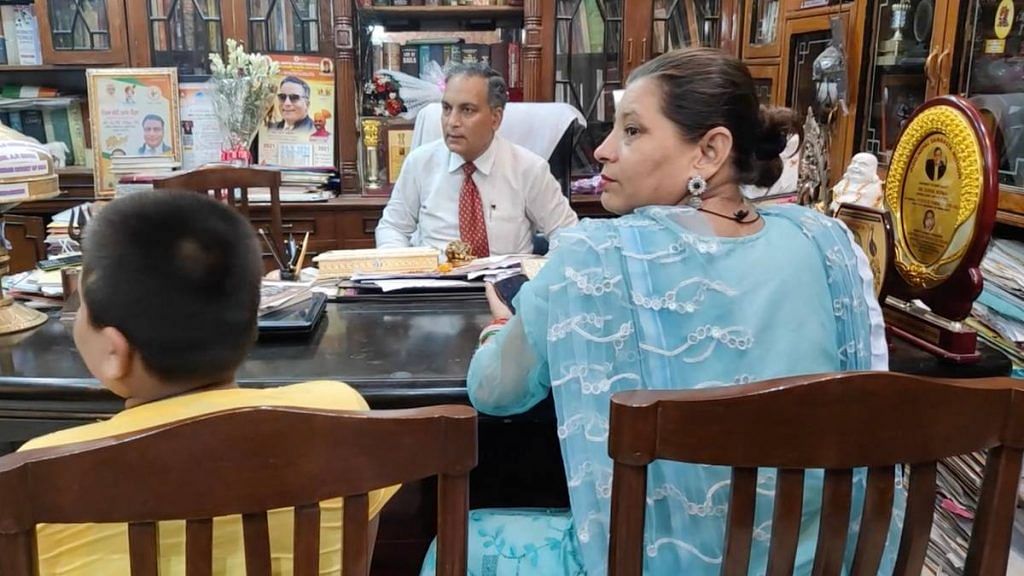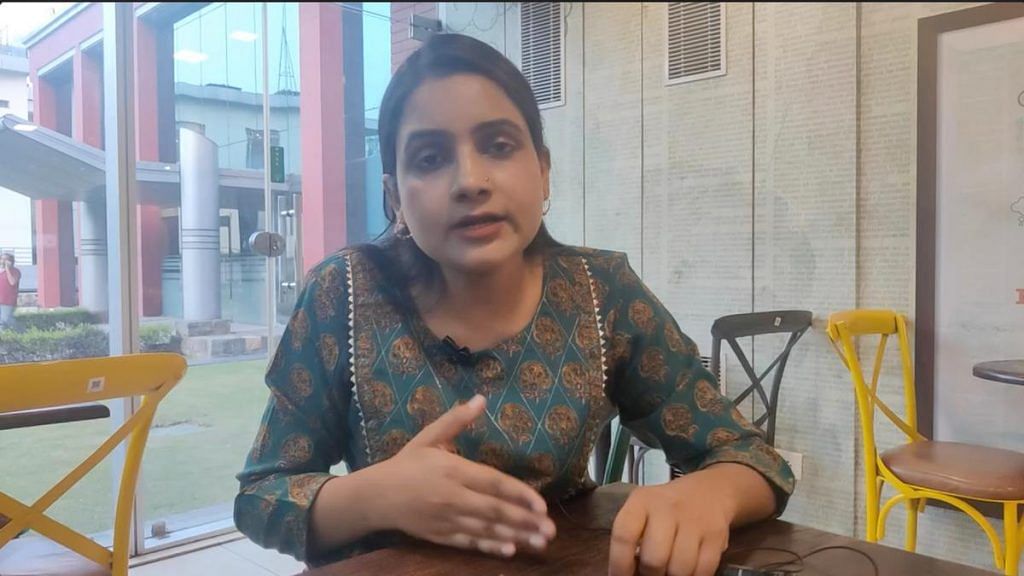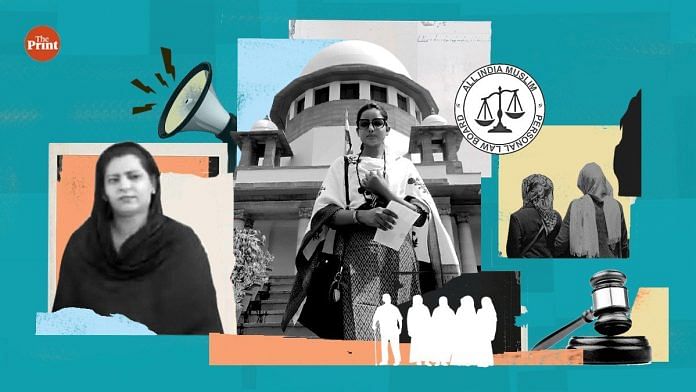New Delhi: If Shayara Bano was the face of the triple talaq storm that transformed India’s debate on Muslim women’s status and polarised politics, Sameena Begum and Benazir Hina are taking the fight forward into three more of the contentious, deep, dark practices in the Muslim community — polygamy, nikah halala, and talaq-e-hasan. They want them repealed.
The battle has divided their neighbourhood and community with demands of group loyalty and silence. In Narendra Modi’s new India, such endeavours have been viewed either as transformation or treason. Religious extremists have threatened and assaulted them. They find themselves in an ethical, religious, and political dilemma.
Their fights against halala, polygamy, and talaq-e-hasan have left Sameena and Benazir socially excluded, isolated, and forced them into a financial crisis.
Both are single mothers. Sameena, 42, an acupressure therapist, is unemployed for health reasons and depends on her mother’s pension. Benazir, 34, earns a modest salary working for a TV channel.
“It is said about me that I have been bought by the BJP and am working on their agenda. But this is a lie. It was also said that I was working against Shariat law. They wanted me expelled from Islam,” Benazir said.
On a burning Delhi afternoon, Sameena and her 11-year-old son arrive at advocate AP Singh’s office in Rajouri Gardens. She is sweating, gasping, and fatigued from diabetes, but determined. Her goal: to talk about petitioning the Supreme Court for the implementation of the Uniform Civil Code, even though they struggle to pay the hefty legal fees.

Singh is optimistic. He praises Prime Minister Modi and the Bharatiya Janata Party (BJP) for the ban on triple talaq in 2019 despite opposition from religious extremists who view “women as puppets”.
“The UPA governments did not provide any protection to Muslim women. The Shayara Bano case was a landmark judgment, which provided security to Muslim women. But it is not enough. There is a need to work for them,” Singh said.
Both Sameena and Benazir had disastrous marriages—and divorces—which fuelled their protracted fight against halala, polygamy, and talaq-e-hasan. The triple talaq campaign and ban has emboldened them to extend their frontline even if it risks earning them suspicion from religious leaders.
But the triple talaq ban has had an unexpected consequence: an increase in polygamy, as noted by Jameela Nishat, founder of the Shaheen Collective in Hyderabad.
“The system has changed after the ban. Now, there are fewer halala cases, but polygamy cases have increased by 10 percent in the city,” she pointed out. “Polygamy should end.”
Talaq-e-hasan allows Muslim men to divorce their wives by declaring talaq once a month for three months. Nikah halala stipulates that once talaq is final, a husband cannot remarry his ex-wife unless she marries another man, consummates that marriage, and gets divorced again.
The Islam that exists in this country is the Islam of some maulanas. This is not our Islam.
-Sameena Begum
But the conversations are, once again, boiling down to whether this is an essential part of Islam. According to the All-India Muslim Personal Law Board (AIMPLB), halala is not mentioned anywhere in Islam.
“There is no Shariat law for this. After completing iddat (a waiting period after divorce is pronounced), anyone can remarry,” said AIMPLB spokesperson Qasim Rasool Ilyas. “When triple talaq is banned, halala automatically becomes invalid. Now there is a useless debate on this.”
Also Read: Indian govt has left Muslim women at the mercy of AIMPLB. Bring in UCC but consult us first
Two women, three divorces, one mission
Sameena Begum and Benazir Hina do not have much in common other than their rocky marriages. Even their divorces were different. But they share one mission: dismantling unjust Shariat laws.
“There is no law in Muslim Personal Law or Shariat to provide relief to women. I want there to be one law for everyone,” Sameena said.
She and her three sons live in a one-bedroom flat in a rundown five-storey building in the Batla House area of Delhi’s Jamia Nagar. The taps drip and the walls are cracked, but Sameena’s eye is on the prize.
She has been through hell and back twice. Her first marriage in 1999 gave her two sons and lasting scars from domestic abuse, she said. When she left to stay with her parents in UP, her husband gave her triple talaq in writing.
Her second marriage, in 2012, ended as badly. A year and a baby into the marriage, her husband abruptly pronounced triple talaq over the phone. Later, she discovered he was already married to another woman, and had married Sameena on a tantrik’s advice.
At first, she felt helpless, but then outrage took over—not just over her own ordeal but that of other Muslim women in similar situations.
The All-India Muslim Personal Law Board has consistently obstructed Muslim women’s fight for reforms, from Shah Bano in 1986 to Shayara Bano in 2016.
Change was also in the air. Sameena said she felt emboldened when, in 2017, the Supreme Court declared triple talaq to be “manifestly arbitrary” and unconstitutional. She was of the view that the same applied to polygamy and nikah halala.
In 2018, she took her battle to the Supreme Court, demanding that Section 2 of the Muslim Personal Law (Shariat) Application Act be invalidated because it backed polygamy and nikah halala. She argued that these practices violated Articles 14 (right to equality), 15 (no discrimination on religious grounds), and 21 (right to life and personal liberty) of the Constitution.
She also wanted nikah halala and polygamy to be treated as crimes, and sought for the implementation of a uniform civil code.
Away from the court, she conducted a door-to-door campaign to educate Muslim women about their rights. In 2019, she ran as an independent candidate for the Lok Sabha election from Rampur. She said her message resonated with many Muslim women.
“There are many rights provided in Islam to women, including rights to property. But in India, Muslim personal laws are not implemented according to Islam,” Sameena said.
The case, meanwhile, drags on. In March 2023, the Supreme Court announced setting up a Constitution bench to hear nikah halala and polygamy cases after two judges on the previous five-judge bench retired.

In another corner of Delhi-NCR, Benazir Hina takes a quick tea break from work at her office in Noida’s Film City. The mother of one works for a private news channel, but her friends say she should become a lawyer because her nose is always buried in law tomes.
In 2021, she married a lawyer, Yusuf Naqi, but a year in, he kicked her out after a fight. Days later, she received a “divorce letter”—not from her husband, but from a friend of his.
“The letter did not mention my husband’s name anywhere. It was not signed. It just said, ‘I divorce you on behalf of my client’,” she said. Two more such notices followed and ‘talaq-e-hasan’ was complete.
But Benazir claims that Yusuf did not follow the correct procedure, which prescribes that the wife must still be living in the marital home when the three pronouncements of divorce are made over three consecutive months.
“I received two notices of talaq-e-hasan when I was at my parents’ home. Then he e-mailed me a third notice. Even now, the practice of triple talaq continues in India through e-mail and post,” Benazir said. “There should be only one divorce procedure in India. Even if divorce is to be given according to the Quran, it should be defined.”
On 3 May 2022, she filed a petition in the Supreme Court demanding a ban on talaq-e-hasan and all other unilateral forms of divorce under Muslim Personal Law.
Yusuf vociferously maintains he did nothing wrong.
“It is clearly stated in the notices: ‘Your spouse has divorced you, and it is through this notice that you are informed of the divorce’. According to talaq-e-hasan and the Supreme Court, it is mandatory that you give notice of divorce in writing or verbally,” he said, speaking to ThePrint over the phone.
There should be only one divorce procedure in India. Even if divorce is to be given according to the Quran, it should be defined
– Benazir Hina
In August 2022, the Supreme Court observed that talaq-e-hasan was “not so improper”. However, in May 2023, it offered to examine the validity of the practice.
Following the petition, Benazir has faced significant backlash both on social media and within her community.
According to the AIMPLB, talaq-e-hasan is considered a non-issue and is being used as a weapon against Muslim men.
“As a result of men’s fear following the ban of triple talaq, couples are now taking ‘khula’ (a form of mutual divorce). Only a few people choose talaq-e-hasan,” said Dr Asma Zehra Tayeba, AIMPLB member and president of the All India Muslim Women Association.
Wedded to ‘tradition’
The AIMPLB has consistently obstructed Muslim women’s fight for reforms, from Shah Bano in 1986 to Shayara Bano in 2016.
In Shah Bano’s case, it pushed to overturn the Supreme Court’s verdict granting maintenance to an elderly woman. In Shayara Bano’s, it argued that men might be compelled to murder their wives if triple talaq was discontinued.
The AIMPLB’s raison d’etre is to resist change. When it was established in 1972, its founding goals included opposing any attempts to reform Muslim personal laws, including those related to marriage, divorce, and inheritance, among others.
This matter is completely politically motivated and has been planned in advance. For this, they have brought Muslim women to the fore
-Qasim Rasool Ilyas, AIMPLB spokesperson
Many of these laws are safeguarded by the colonial-era Muslim Personal Law (Shariat) Application Act of 1937, providing a legal framework that the AIMPLB staunchly defends.
But the Shariat Act is also notoriously open to interpretation — it only says that Muslims will be governed by their laws, but does not give specifics. This, many Muslim women argue, leaves room for discriminatory and unjust practices to continue.
Now, a tide of dissent is growing and these voices are becoming even stronger and louder.
“The Shariat law of 1937 remains in effect. And it is currently being implemented arbitrarily. Now, it is necessary to determine the age of marriage. How many assets will the woman receive? Who will receive parental responsibility? This requires definition,” said activist Zakia Soman, the founder of the Bharatiya Muslim Mahila Andolan (BMMA), who was at the forefront of the fight against triple talaq.
The AIMPLB, as usual, has dug in its heels.
An essay on its website, for instance, offers a spirited defence of polygamy. However, it clarifies that Islam does not “recommend” the practice but only “allows” it under certain circumstances. The rationale includes situations that led to a surplus of women, such as wars.
“Now there are more men and more women. No more wars are being fought. Then all this should stop,” Soman said.
The AIMPLB argues there is no need and instead points a finger at other Indian communities. “Hindus and Christians practice polygamy more than Muslims. Among Muslims, it is unusual,” Ilyas said.
According to the National Family Health Survey-5 (2019-21), the prevalence of polygamy was 2.1 percent among Christians, 1.9 percent among Muslims, 1.3 percent among Hindus, and 1.6 percent among other religious groups. The prevalence is highest in the Northeastern states among tribal populations.
The women aren’t willing to wait around for gradual ‘change from within’ to take hold.
The AIMPLB rejects the notion that Shariat law on divorce is patriarchal or violates women’s rights.
It points to two forms of divorce that allow for women’s participation: khula and talaq-e-ahsan. In khula, the wife initiates the divorce by returning her mahr (wedding gifts) to her husband. In talaq-e-ahsan, the husband pronounces divorce in a single statement, but the divorce is reversible if the couple reconciles within the 90-day iddat period.
Ilyas, however, acknowledges that divorces at times are granted even if the husband doesn’t follow the prescribed procedure.
“Many things are not mandatory in Islam. It is better to follow the procedure, but if someone doesn’t, then many schools of thought of Islam say that divorce takes place,” he said.
“The Special Marriage Act is an open option for everyone. If a woman doesn’t want personal law to apply to her, then she can adopt it. Shariat law will not apply.”
‘They beat us, accused me of going against Islam’
Since knocking on the Supreme Court’s doors, Sameena and Benazir’s battles have only doubled. They’ve been shunned, labelled as pawns of the Hindutva agenda, and endured the looming threat of violence at the hands of religious extremists. They fear for their children’s safety too.
The backlash they’ve encountered is not unique to the Muslim community. As scholar Miriam Kuttikat notes in a 2008 paper, the oppression of women transcends religious boundaries.
“Religion reinforces male supremacy by controlling women’s movements, and not supporting them in their resistance to abusive practices,” she writes.
When Shayara Bano went to court, she claimed that clerics tried to coerce her into dropping her case and “sacrificing” herself for Islam.
Sameena said her worst fears became a horrifying reality in 2018 when someone informed her landlord that she had filed a petition in court against halala and polygamy. This triggered an outburst of violence, with her landlord and a group of men allegedly barging into her house and brutally trying to force her to withdraw the petition. They didn’t spare her youngest son, Faizan, who is now 11.
“They made me and Faizan sit on the same chair for hours and beat us up. They tore my clothes. They pressured me to withdraw the case. I told them that the court was closed. Once it opens, I will take it back. They accused me of going against Islam,” Sameena recalled, agitated at the memory.
She went to the police, but received no help until public pressure mounted through social media. Later, when she brought the incident before the Supreme Court, she was provided security.
Despite the ordeal, Sameena chose not to withdraw her case, but had to leave her home. Her son, still scarred by the incident, jumps with fear whenever someone knocks on the door. “I feel scared when my mother goes out or discusses this matter,” he said in his hushed voice and left the room.
Not far in the list of troubles is the whisper campaign about the women’s ‘motives’.
‘Politically motivated’
Many in the Muslim community say that their petitions are politically motivated, and the AIMPLB is leading the charge. They point to lawyers such as Ashwini Upadhyay, a BJP leader, appearing for Benazir.
“This matter is completely politically motivated and has been planned in advance. For this, they have brought Muslim women to the fore. Their intentions are something else,” said Ilyas.
He added that the AIMPLB believes in “reforms” in the Muslim society instead of amending the Constitution.
“If a mistake occurs, there is a way to correct it. Things don’t get fixed with the force of a stick. Change comes in society through reform. There is no need to amend the Constitution for that,” Ilyas said.
Notably, on 18 September, the AIMPLB launched a nationwide campaign aimed at ensuring that women inherit their fathers’ property. It pointed out that while Shariat law does allocate a specific percentage of a father’s inheritance to daughters, this provision is rarely enforced.
We have huge diversity—how can you cage everyone in the same box? There is indeed an issue with personal law, but it requires a nuanced approach
-Mumtaz Shaikh, activist
It also acknowledged that women face dowry demands, attacks on their dignity and chastity, workplace exploitation, domestic violence, and more. “The Board took strict notice of these matters and decided to reform society from within,” the AIMPLB said in a statement.
However, the women are not willing to wait for gradual ‘change from within’ to take hold. They say they are not opposed to Islam but to maulanas and men who violate women’s rights in the name of Islam.
“The Islam that exists in this country is the Islam of some maulanas. This is not our Islam. We do not want the Islam of these maulanas who are making laws as per their whims,” Sameena said.
Building a brigade
When Kolkata-based Malika received talaq-e-hasan from her husband, an Air Force officer, she felt lost. A glimmer of hope came when a friend shared a video on WhatsApp in which Benazir was offering to guide anyone who had received an improper talaq-e-hasan.
Malika reached out to her on Facebook. She was so inspired by Benazir that she decided to come to Delhi and become a co-petitioner in the case. “Benazir helped me get legal help. She guided me and put me in touch with lawyers,” Malika said.
Both Sameena and Benazir strive to turn their legal battle into a social movement. They want to spark awareness and a fire in the belly of other Muslim women.
A lingering doubt remains: will victory be sufficient? The women’s disappointment with how the ban on triple talaq has played out makes them wonder.
Though Sameena’s health has largely left her homebound, she remains a force on social media. She shares songs, discusses patriotism, and addresses issues concerning Muslim women and social justice.
“Islam and Shariat provide property rights to women. Yet, barely two percent of brothers give properties to their sisters. If she demands it, they shut the door of their houses,” she said in a video, urging Muslim women to join her movement. “Why do we always have to fight for our rights?”
Benazir said many women connect with her through e-mail, Instagram, and Facebook to express their support and laud her for her courage. Some have even joined the fight.
“Approximately 12 women from Uttar Pradesh, Maharashtra, and Karnataka have joined my PIL as co-petitioners,” Benazir declared. “They are all divorce victims determined to put an end to this.”

Court-kacheri
Fighting injustice is one thing, but the harsh reality of court appearances and legal expenses is another, especially for petitioners who must travel long distances to appear before the Supreme Court.
Malika travelled from Kolkata for the first time by herself to submit her PIL against talaq-e-hasan as a co-petitioner. She had to spend two days in Delhi to complete the procedure, and she was terrified.
The costs are a huge challenge too.
“Court expenses are extremely high. Occasionally, I try to assist women, but it is difficult for me to support everyone. We sometimes have to request lawyers to reduce the fees,” Benazir said. “We have the same petition but different counsellors. Daily expenses range from Rs 3,000 to 5,000, which increases for women from other cities.”
Beyond these obstacles, a doubt lingers: will victory be sufficient? The disappointment with the way triple talaq ban has played out makes the women wonder about the outcome of their fight against halals and polygamy.
‘BJP has not acknowledged our pain’
In 2017, the Supreme Court invalidated the practice of triple talaq, which allowed men to divorce their wives simply by uttering “talaq” three times, even via email or text. Two years later, in 2019, Parliament criminalised the practice.
Sameena says this gave women courage, but did not secure their rights. She argues that women don’t just need a symbolic victory, but empowerment through employment, education, and financial support.
According to her, the BJP government has not delivered on this front yet and has so far turned a blind eye to the continuing challenges of Muslim women.
“Muslim women supported the BJP and voted for them. But perhaps the government is considering these women only as a vote bank. This is wrong. The BJP has not acknowledged our pain,” Sameena said. “I’m raising my three children without any help from the BJP.”
The triple talaq ban has also been criticised for other reasons. Some have argued that it is just another way to press charges against Muslim men. Others, including women, have said they don’t need the BJP to rescue them.
Before, we used to see 30 to 40 triple talaq cases every month, but now it’s just one or two in the entire state of Maharashtra
-Noorjehan Safia Niaz, BMMA activist
There have also been questions around the enforcement of the ban.
Mumtaz Shaikh, an activist from Mumbai who was part of the anti-triple talaq campaign, said that enforcement is lacking, partly due to widespread confusion regarding the rules.
“Most women are hesitant to get their husbands arrested, but the rules should be clearer in such cases,” she said.
Social activist Noorjehan Safia Niaz of the Bhartiya Muslim Mahila Andolan (BMMA) and one of the petitioners concurs that the law should have clearly specified the proper process for divorce, rather than primarily addressing how it should not be granted.
However, she claims that triple talaq cases have drastically decreased since the ban.
“Before, we used to see 30 to 40 triple talaq cases every month, but now it’s just one or two in the entire state of Maharashtra. The numbers have gone down a lot, partly because some qazis stopped performing such divorces,” she explained.
Also Read: Muslim men have found a way around Modi’s triple talaq ban—torture wife to give khula
The UCC dilemma
Anxieties persist among Muslims that the UCC is just part of a political agenda to not just supplant Muslim personal laws but erode the community’s identity.
With Prime Minister Narendra Modi’s vocal support for the UCC, these concerns loom larger than ever. In June, the Law Commission of India issued a public notice to gather views and opinions on the UCC from the “public at large” and “recognised religious organisations”.
Muslim women are divided over the issue too.
While some like Benazir and Sameena ardently advocate for the UCC’s implementation, the BMMA insists that the codified family law they’ve demanded for the past two decades must be enforced.
Another section of women argues that if constitutional modifications are made to Muslim personal law, there will be no need for a UCC.
Shaikh wonders if a UCC in India is even a realistic aspiration.
“We have huge diversity — how can you cage everyone in the same box? There is indeed an issue with personal law, but it requires a nuanced approach,” Shaikh said. “Constitutional amendments should be done to reform Muslim personal law.”
But Benazir and Sameena are bracing for the long road. They say it took the courts many years to ban triple talaq, and now they are ready to wait for another decade for the UCC.
(Edited by Asavari Singh)



